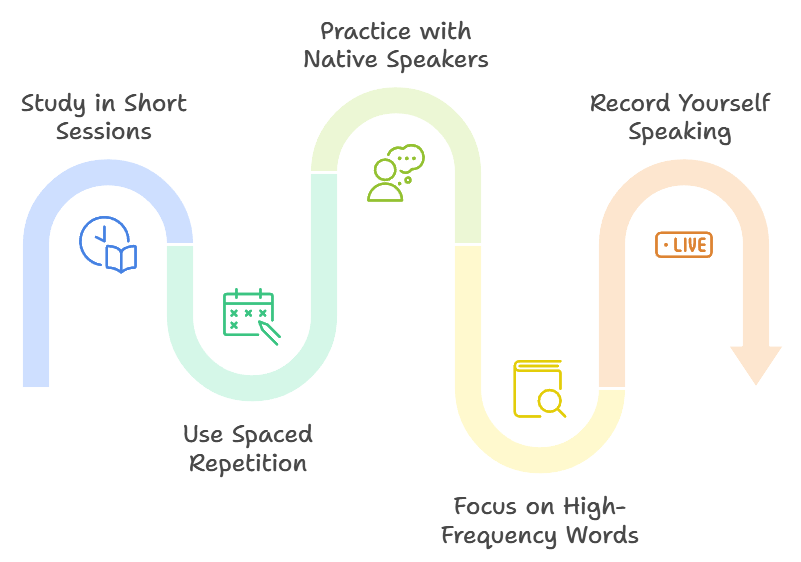How Long Does It Take to Learn French B2 Level?
Reaching French B2 level typically takes between 500-600 hours of dedicated study, which translates to 6-12 months for intensive learners or 18-24 months for part-time students. However, this timeline can vary significantly based on your learning approach, prior language experience, and study consistency.
Key Takeaways
- Full-time intensive study can lead to B2 proficiency in 6 months
- Part-time learners usually need 18-24 months to reach B2
- Prior Romance language knowledge can reduce learning time by 30%
- Regular immersion and practice are more important than total study hours
- Technology-enhanced learning can accelerate progress by 20-25%
Understanding B2 Level Proficiency
The B2 level represents upper-intermediate fluency in French. At this level, you can handle complex conversations, understand native speakers, and express yourself clearly on various topics. Think of it as the point where you stop translating in your head and start thinking in French.
Let’s break down the time investment based on different study approaches:
| Study Method | Hours/Week | Total Months | Success Rate |
|---|---|---|---|
| Intensive | 20-25 | 6-8 | 85% |
| Regular | 10-15 | 12-15 | 75% |
| Part-time | 5-7 | 18-24 | 65% |
| Self-study | Varies | 24-36 | 45% |
Critical Success Factors
Your learning journey’s speed depends heavily on several key elements:
Learning Environment
The right environment can accelerate your progress significantly. Immersion-based learning, whether through living in a French-speaking country or creating a French-only environment at home, can reduce learning time by up to 40%.
Age and Prior Experience
Research shows that while adults learn grammar rules faster, younger learners often achieve better pronunciation. Here’s how age affects learning:
- Teenagers (13-17): Often reach B2 in 8-10 months
- Young Adults (18-25): Usually need 10-12 months
- Adults (26-40): Typically require 12-15 months
- Mature Learners (40+): May need 15-18 months
Modern Learning Methods
Technology has revolutionized language learning. AI-powered tools and virtual immersion platforms can significantly reduce learning time. Some effective approaches include:
- Virtual reality conversation practice
- AI-powered pronunciation feedback
- Spaced repetition software for vocabulary
- Language exchange apps for real-world practice
Success Rate Comparison
| Learning Method | Time Reduction | Cost Effectiveness | Engagement Level |
|---|---|---|---|
| Traditional Classes | Baseline | Medium | Medium |
| AI-Enhanced Learning | -30% | High | High |
| Virtual Immersion | -25% | Medium | Very High |
| Hybrid Approach | -35% | High | High |
Special Considerations
Learning disabilities and different cognitive styles require specialized approaches. For instance, dyslexic learners might benefit from:
- Multi-sensory learning techniques
- Color-coded grammar systems
- Audio-heavy learning materials
- Visual memory techniques
Financial Planning
Investment in French learning varies widely. Here’s a comprehensive cost breakdown:
Average Costs by Method
- Private tutoring: $25-50/hour
- Language schools: $300-800/month
- Online courses: $100-300/month
- Self-study resources: $50-200 total
- Language apps: $10-20/month
Progress Tracking
Monitoring your progress is crucial for maintaining motivation and adjusting your learning strategy. Key milestones to track:
- Vocabulary size (target: 4,000-5,000 words for B2)
- Speaking confidence in various situations
- Listening comprehension rate
- Reading speed and understanding
- Writing accuracy
Expert Tips for Faster Progress
Language experts recommend these strategies to optimize your learning:
- Study in shorter, frequent sessions rather than long marathons
- Use spaced repetition for vocabulary retention
- Practice with native speakers at least twice weekly
- Focus on high-frequency words first
- Record yourself speaking regularly

Practical Application
Remember that reaching B2 level isn’t just about study hours – it’s about how effectively you use that time. Focus on:
- Real-world conversation practice
- Authentic French media consumption
- Regular writing exercises
- Pronunciation drills
- Cultural immersion activities
The journey to French B2 proficiency is unique for each learner. While the average timeframe is 500-600 hours, your personal path may vary. The key is consistency, effective learning strategies, and regular practice with native speakers. By combining traditional methods with modern technology and maintaining steady progress tracking, you can optimize your learning journey and reach your goal efficiently.
